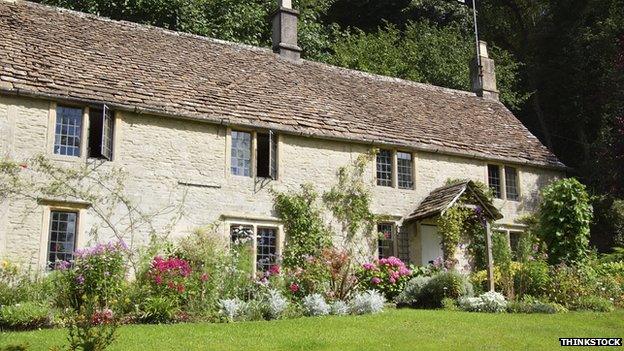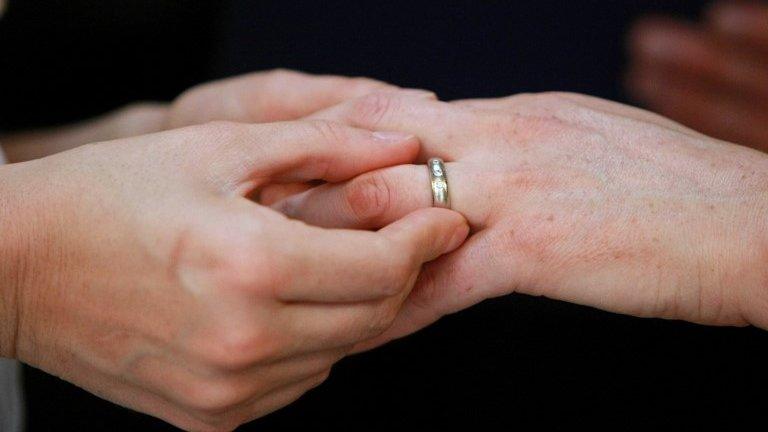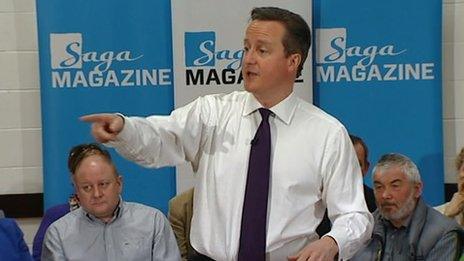How to reduce your Inheritance Tax bill
- Published

House price increases mean millions more people are now subject to inheritance tax
"We all want to see a system where it is only the very rich that pay inheritance tax, and not hard working people."
Those were the words of David Cameron during Prime Minister's Questions last week.
But despite these intentions an increasingly large number of people will leave their loved ones with a hefty tax bill when they die.
The current inheritance tax (IHT) threshold is £325,000 per person. It doubles to £650,000 for a married couple - as long as the first person to die leaves their entire estate to their partner.
Anything over this limit is subject to a 40% tax bill.
So what sort of people are now having to pay IHT, and if that is likely to include you, how can you legitimately reduce your bill?
'Unfair'
Property price increases are dragging many middle class working families into the tax bracket.
The average price of property in London is now £514,000, while it has reached £338,000 in the South East. That means many single or divorced people who own their house, will owe tax on their estate when they die.
The Office for Budget Responsibility (OBR) calculates that 4.8% of the population currently pays IHT. By 2018-19, it estimates that figure will have more than doubled, to 10%.
Bob Dyson has found himself being dragged into the net. In 1987 he bought a house in north London for £115,000. It is now valued at £800,000.
He is furious to find out that his daughter might have to pay a six figure sum in tax, should he die in the next few years.
"I have been paying income tax on the nose for the last 50 years, and now I find out that I could have to pay tax again on the house. It's already taxed money. I think it's a tax on being prudent," he says.
"It's unfair and the threshold should be raised."
Reducing tax
But there are options for people who find themselves in Bob's position.
"If you plan ahead you can totally legally reduce your inheritance tax bill," explains Claire Walsh, a chartered financial planner from Aspect 8 in Brighton.
Clearly the best way to avoid paying any tax is to reduce your estate value to below the £325,000 threshold.
"Start enjoying your retirement is always the first piece of advice I give," says Claire Walsh.
"I also often find myself telling people to get married as well. Married couples have their threshold doubled to £650,000," she says.
Changes to pension legislation could also offer a way around IHT.
As of April 2015 pension pots will no longer be subject to a 55% tax when passed on to loved ones after the saver dies. This means that any funds in a pension pot can be passed on to a named individual without any tax implications if they die before the age of 75.
"I would advise clients to consider transferring all their non-pension assets to fund their pension," says Scott Gallacher, chartered financial planner at Rowley Turton in Leicester.
"By shifting your savings into a drawdown scheme they will no longer be included in your final estate valuation, and therefore will avoid inheritance tax," he advises.
Gifts

You can give up to £3,000 a year in gifts tax-free
Giving gifts is another way to reduce your final estate value. Each year you can give away £3,000 with these gifts falling outside your estate immediately.
You can also gift larger sums of money but these will stay within your estate valuation for seven years, another reason why it is good to plan ahead. Assuming you live for seven years, then these gifts fall outside your estate and avoid IHT.
A way to safeguard these gifts before the seven year deadline is for the beneficiaries to take out life insurance against an inheritance tax bill. This is especially popular for single parents who do not want children to have to sell the family home to pay a tax bill.
In addition, if you have an income - a pension, earnings, or dividend payouts - and you give money regularly, then it is also exempt.
And remember gifts to political parties and charities are also free of IHT.
'Squeezed middle'
Despite all the options available, unless you give your house away, it is hard to avoid inheritance tax on what is probably your most valuable asset.
Many argue that the threshold should at least rise each year in line with inflation, but now the rate has been fixed since 2009.
The Conservative election manifesto outlined plans to raise the threshold to £1m, citing house price rises. But their Liberal Democrat coalition partners blocked this move.
"The key people who are caught up in inheritance tax are the squeezed middle. These are the people with the bulk of their wealth tied up in the family home," says Scott Gallacher.
- Published1 October 2014

- Published24 March 2014

- Published29 September 2014
